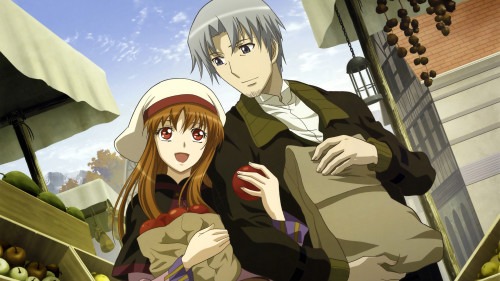
Spice and Wolf first released as an anime in 2008. The series has a soft spot in my heart; I watched it when I was going through a heartbreak and when I was still new to anime. I’m slowly working through the light novels. They aren’t available in my library system, so I’ve been buying the novels in recent years. Spice and Wolf remains one of the most grounded stories I’ve seen in anime, centering around economic and business deals for its conflict and plot. Lawrence and Holo remain one of the best pairings as well. The dialogue in the short-lived anime remains one of the best. The vocal chemistry between J. Michael Tatum as Lawrence and Brina Palencia as Holo hearkens back to the dialogue and chemistry I enjoy from movies dating to Hollywood’s Golden Age. I prefer the English dub over the Japanese audio. Only a few other anime enjoy that preference: Cowboy Bebop and Samurai Champloo sit on that short list. Lawrence and Holo banter and tease each other relentlessly and it’s wonderful.
Holo and Lawrence are adults moving through a believable Renaissance-era world. There’s none of the usual high-school shenanigans or shonen-hero situations. Debt, money, and hard work for Lawrence’s modest dream of settling down in a town to run a shop tie all the situations together. Spice and Wolf is a road story of two travelers growing close, rifting apart, and making amends. Holo and Lawrence are both troubled by loneliness. As Holo states:
“Loneliness can be a fatal disease.”
Holo’s loneliness comes from the fact she’s a long-lived wolf. She has nightmares of Lawrence dying of old age and leaving her alone. She is troubled by memories of solitude lasting centuries and by how she exists in neither the human nor animal world. This thread is only touched upon occasionally in the story, but this concern lends Holo’s behavior with sadness. The story is lighthearted for the most part, but without this touch of sadness, the lightness wouldn’t land so well.
Holo and Lawrence are equals to each other and support each other. Both are strong characters and prideful. That pride is the source of their conflict and mutual attraction. Their combined intelligence gets them through all sorts of economic hardships and business failures, but the strain of such hardships sometimes strains their relationship. Like so many aspects of the plot, this is realistic. The economic realism balances the fantastic element of Holo being a wolf that can manipulate wheat and fields. Time to time, the fantasy elements return to add spice (pun intended) to the grounded story.
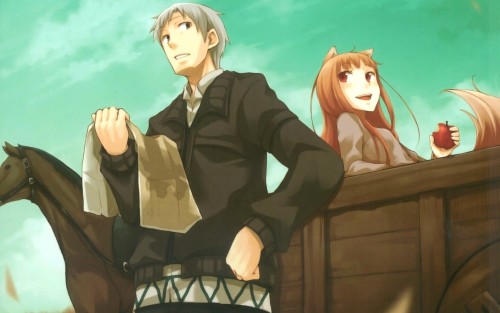
The situations can get tangled with veiled business moves under the surface, but the situations are modeled after real-life business tangles: coin devaluation and a Spice and Wolf version of the tulip panic of history. The dangers of credit and leverage are also explored. Across the arcs, Lawrence hits one of his lowest points just as his relationship with Holo is still in a precarious beginning. Holo, to her nobility, sticks by him. This dynamic to their relation along with their banter elevates their maturity above what we see in the more common high-school stories. They keep the audience engaged even when the economics turns the audience off, and, let’s face it, most of the economic plots are hard to follow unless you have a nerdy interest in economics.
I have to mention Holo’s nudity. At the beginning of their journey, Holo appears naked before Lawrence. Lawrence has had experience with women before–even visiting a brothel with his friends when he was younger. So, he doesn’t react as most anime males do. He was more focused on Holo’s tail and wolf ears. The story doesn’t present Holo’s nudity as [only] fan service. Rather, her nudity acts as a show of her character development. Holo moves from animal-like nudity to dressing modestly as she becomes more human. She feels comfortable with Lawrence, and Lawrence appreciates her figure as seen with his more mature embarrassment. There’s no overreaction or other high-school story silliness. Nudity by itself isn’t fan service. The circumstances around the nudity determines if it is fan service or not. Fan service has a voyeuristic element to it, as shown by the character reactions. Spice and Wolf‘s humor comes from the teasing and banter and not the usual low-brow fan-service gags. Lawrence is dense and confused at times, but then guys often misunderstand women. Lawrence has his hands full with Holo! When they argue, they argue constructively, eventually coming around to a solution or understanding in the process. In the end, they trust each other.
Holo and Lawrence provide a good example of a healthy, securely attached couple. They aren’t without their problems, jealousies, or difficulties. But they care and respect each other enough to work through it. Lawrence has a naivete despite his experience, which Holo likes to point out. She is naive in her own way too.
The church plays an interesting role in the world of Spice and Wolf. The church is ever present, mostly in the background, but its influence can be felt through most of the situations Lawrence and Holo end up in. Paganism sits uncomfortably beside the growing power of the church, and the church poses a threat should Holo’s secret be revealed.
I revisit Spice and Wolf every so many years. As with Cowboy Bebop, Samurai Champloo, and a few others, I own physical copies. Each time I revisit the story, Holo and Lawrence’s antics remain fresh. The every-day feel of the story and lack of tired anime tropes is such a rarity that this series stands out. Unfortunately, the anime only had two seasons.
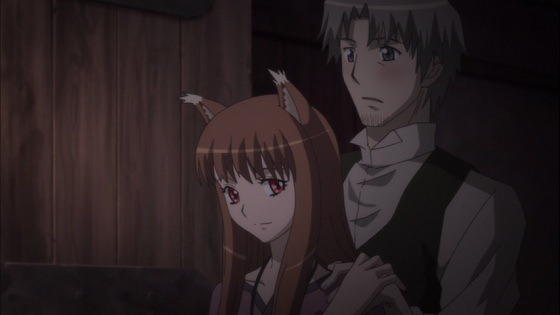
The Spice and Wolf anime remains unfinished, ending near the middle of another arc and leaving us with an unsatisfactory ending. Spice and Wolf also has a manga that, while complete, has story problems of its own. As it stands, the light novels are the only means to enjoying the entire story. It’s a shame the anime ends as it does, cutting off Lawrence and Holo’s adventure and relationship with a dangling loose thread. Another criticism of the anime is how often it uses a “third wheel” ploy to bring more focus on Holo and Lawrence. The anime does this because of how it must compress what the light novels have time to develop. Novels can cover more ground than animation or live action can, which is why people often say “the book is better than the movie.” In Spice and Wolf’s case, this is especially true. By introducing a direct threat to Lawrence and Holo’s relationship in addition to the economic conflicts (which are quite thrilling), the anime can speed up the process the light novels take their time developing. Visual media have to compress novels in this way. Even the Lord of the Rings movies compresses the novels by relegating various details to the setting. Books are the superior way of telling stories because of how much more space they have. However, visual media like anime can have more emotional impact with their combination of music, dialogue, and visuals. Spice and Wolf is a long novel series. It’s unlikely this anime or any remake would be able to handle all the content the novels cover. Compression and cutting becomes vital. There’s a certain irony that economics was the reason behind the unfinished ending to the anime. There’s too much content for a limited budget and development time. Although, I would enjoy a Naruto level coverage of Spice and Wolf, one that can cover the entirety of the novel series.
Spice and Wolf offers many lessons for us. First, Lawrence and Holo don’t give up on each other. Their developing relationship has many, many difficulties, starting with the fact Holo is long-lived wolf and Lawrence is a short-lived human. They also face many plot challenges that would break apart a lesser couple’s bound. Too often today couples break apart when faced with irreconcilable differences (wolf and human) or with life’s challenges. People don’t try to negotiate, understand, or communicate with each other. Relationships are imperfect; communication is haphazard and incomplete. Understanding is rife with misunderstandings. But relationships are a journey that involves sunshine and sleeping in the rain. While the anime has Lawrence and Holo struggle with jealousy and problems, they come to trust each other. Trust is vital for a relationship, and it must be fostered (the second lesson). Trust takes time to build and moments to lose. But some understanding needs to be offered when your partner is in a dark place. In the anime, Lawrence becomes bankrupted and faces slavery to pay off his debt after a scant 2-day reprieve. He lashes out at Holo. Instead of losing her trust in him, Holo doubles down in trying to help him. She remains by him. The third lesson: keep a child’s heart. Holo and Lawrence, despite being adult, tease and banter and otherwise act silly with each other. Keeping a child’s heart means playing together. Their playfulness keeps them together. And the fourth and final lesson comes from their openness. When Holo and Lawrence are open with each other their relationship goes smoother. Whenever they hide something from the other, even for a compassionate reason, a conflict breaks out. At one point, Lawrence hides the fact Holo’s homeland may have been destroyed. He hides it out of concern for her. However, when Holo learns of this, she’s hurt and angry and afraid, which leads to Lawrence thinking their relationship may be ending. Holo wishes he would’ve been upfront with her even if it was hard rather than have the information come out as it did. Our lesson: be upfront with your partner even when it is hard.
Despite the anime’s unfinished ending, Spice and Wolf retains a spot in my heart because of Lawrence and Holo’s interactions. It’s a joy watching them grow together as they do. The economic problems are thrilling with the tension that you can feel even if you don’t fully know what is going on. Spice and Wolf‘s anime was handled poorly with its ending, but I’m still fond of it. Tatum and Palencia nail the dub. Their banter and chemistry is great. Whenever I read the light novels, I read the dialogue in their voices. Despite its problems, I still recommend the Spice and Wolf anime if you enjoy good characters. Holo and Lawrence stand out among anime characters and are a lot of fun to spend time with.
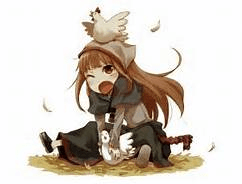
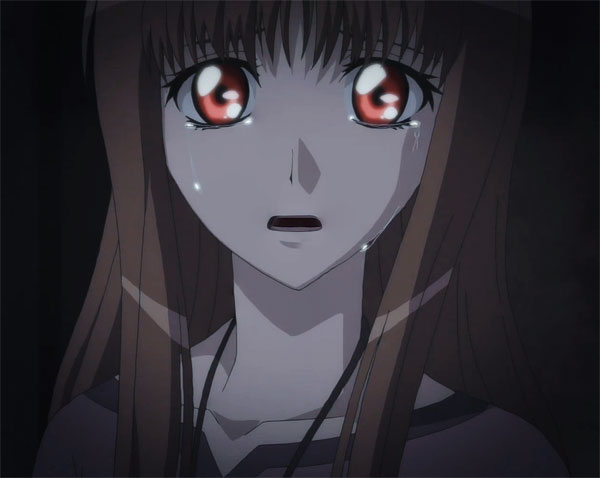
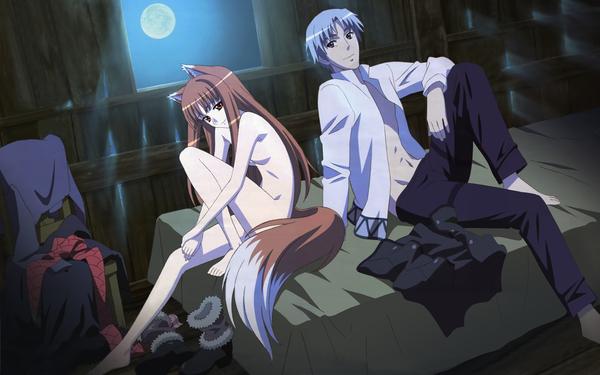
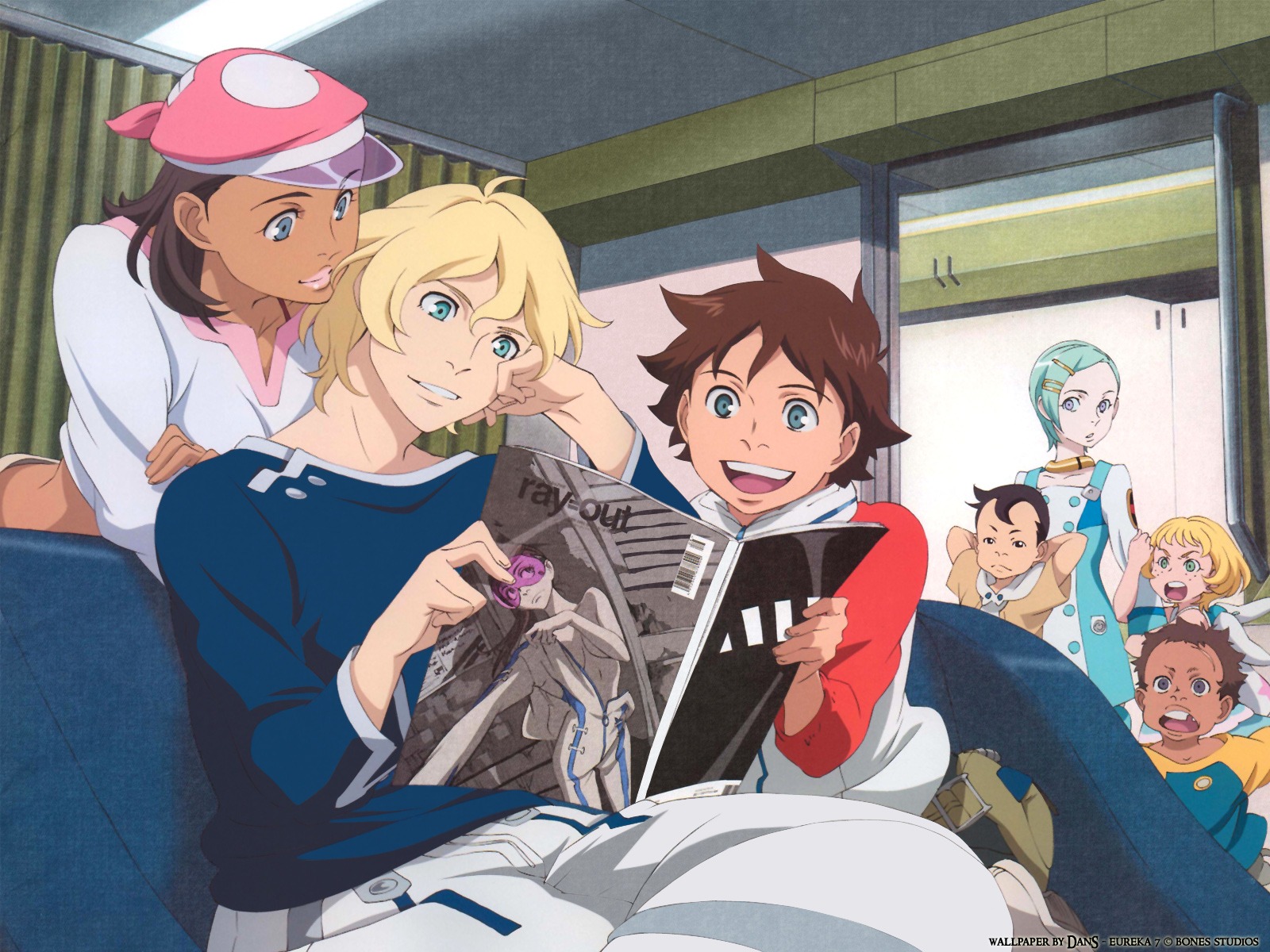
What do you think of the new anime that’s been announced? Not a continuation however but a remake. They supposedly will restart from the beginning. Will they avoid the problems you mentioned this time? Time will tell?
I look forward to it. From what I’ve seen, the art attempts to match the art designed for the novels. Time will tell if they can reduce or avoid the problems I discussed. I expect compression and for the anime to skip some of the plot of the novels. But I might be surprised too. As long as the story can reach the end. For the English dub, I hope J. Michael Tatum and Brina Palencia return.